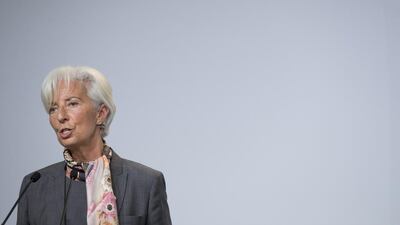Capital flows to emerging market countries fell by $1.1 trillion in the five years to 2015, a warning sign that these countries could face new economic crises as their growth prospects worsen, an IMF report said yesterday.
The fund’s research showed that emerging market countries were recipients of net inflows equivalent to 3.7 per cent of GDP in 2010. Five years later, that had reversed to a net outflow of 1.2 per cent of GDP in the year through September 2015.
This change has been driven by reduced growth prospects, which have led investors to look elsewhere for returns. Emerging markets could face “costly economic crises” as a result, the IMF said.
Emerging markets account for a bigger share of the global economy than in the past and are more fully integrated into global financial markets – meaning that an emerging market economic crisis would have big repercussions beyond its borders, the IMF said.
“The slowdown in net capital inflows started in earnest in … 2010. Three-quarters of emerging markets … have been affected,” said Luis Catão, the senior economist at the IMF’s research department and a co-author of the research. “Emerging markets this time … are more integrated into the world economies.”
The Gulf has not been immune to these trends, the IMF data showed. Saudi Arabia’s net capital flows fell by 10 per cent of GDP between 2010 and last year, as part of a global investor move away from emerging markets with slowing growth rates, the IMF data showed.
“All these countries are running current account deficits. So these countries need to attract capital from abroad,” said Jason Tuvey, emerging markets economist at Capital Economics. “If they’re struggling to do so, then countries need either tighter fiscal policy, which weighs on growth, or they will face problems financing their deficits.”
The IMF published its research ahead of its quarterly World Economic Outlook, in which it is due to update its forecast for global growth.
It will cut its headline estimate for global economic growth this week, Christine Lagarde, the IMF managing director, said on Tuesday.
China and Russia account for $675 billion of emerging market outflows, more than half of the total. Russia has been hit by US and European Union sanctions that have limited investment in the country and made it harder for state-aligned companies and banks to do business abroad.
China’s stock market experienced a rout in June last year, followed by a second wave of declines at the beginning of this year. China’s slowing economy, and worries that official data understate the size of the slowdown, have worried investors that the country will have difficulty transitioning from a manufacturing to a services-led economy. The IMF said that China will grow by 6.3 per cent this year – down from a peak of 14.2 per cent in 2007.
Global stock market prices are now increasingly dependent on fluctuations in China’s growth rate, the IMF said earlier this week.
More dovish policy from the Federal Reserve has offered emerging markets “short-term respite”, said Philippe Dauba-Pantanacce, the senior economist for the Middle East at Standard Chartered.
Relaxed guidance on interest rates “has given a boost to emerging market assets in the first quarter of the year”, he said.
“This short-term respite should not detract from the need to conduct structural reforms in many of these emerging market countries.
“Political risk has also come back with vengeance and is very much present in major emerging markets, including Russia, South Africa, Brazil, Turkey, certain eastern Europe countries.”
abouyamourn@thenational.ae
Follow The National's Business section on Twitter

